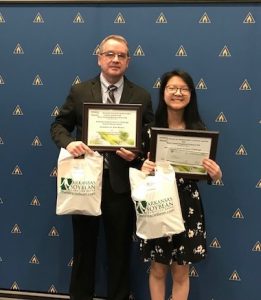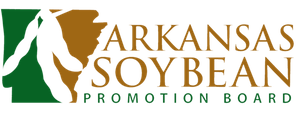Emily Sookaserm 2019 Arkansas Soybean Science Challenge Award Winner ASMSA-West Central Science Fair

Emily Sookaserm, age 17, a senior at Arkansas School for Mathematics Sciences and the Arts won, the Soybean Science Challenge at the 2019 West Central Science Fair held on February 21.
Emily Sookaserm, Arkansas School for Mathematics, Science and the Arts, Hot Springs, AR
Teacher: Dr. Brian Monson
Category: Plant Sciences
Project Title: Identifying quantitative trait loci for grain size and chalk content in a bi-parental tropical Japonica rice mapping population.
Abstract: Chalky rice can be detrimental to grain quality, marketability and food security. Chalk collects in areas where starch granules are less compact, which weakens the structural integrity of the grain. Chalky rice is unattractive, impairs cooking quality, and results in lower milling yields. In this study, length, width, length/width ratio, and chalk content was collected using a scanner and analyzed using WINseedle for the tropical Japonica offspring of parent lines Estrela and NSFTV 199 (GSOR301227 and GSOR301190), sc14. The goal was to identify if there was a correlation between the length, width, length/width ratio, the amylose content of rice, and chalk content; and identify the location of the chalk trait loci using known marker data for SC14. Results show that there is no correlation between the length and width of the rice grain to its chalk content. There was a weak correlation between amylose and chalk contents. The chalk loci was mapped with QGene and was found on Chromosomes 1,5 and 8. The markers on Chromosome 1 and 5 were known, however, the marker on Chromosome 8 was not for SC14. The markers closest to the peak LOD (logarithm of the odds) were located at RM283, RM437 and RM1148. These markers can be used to identify whether the chalk trait is present. The data collected in this experiment will be used to inform US growers, and the seed will be available for more research on other traits and to expand the sample collection.
Emily Sookaserm wins 2019 Arkansas Soybean Science Challenge Award at ASMSA-West Central Science Fair
Emily Sookaserm, age 17, a senior at Arkansas School for Mathematics, Sciences and the Arts (ASMSA) in Hot Springs won the Soybean Science Challenge at the 2019 West Central Science Fair held at ASMSA, February 21.
Sookaserm received a $300 cash award provided by the Arkansas Soybean Promotion Board at the awards ceremony. Her science fair project titled “Identifying quantitative trait loci for grain size and chalk content in a bi-parental tropical Japonica rice mapping population” also received second place in Plant Sciences at both the regional fair and Junior Academy of Sciences. Sookaserm will compete at the Arkansas State Science and Engineering Fair March 29.
Sookaserm will compete at the Arkansas State Science and Engineering Fair March 29. Dr. Brian Monson, Sookaserm’s teacher, won the $200 Soybean Science Challenge Teacher Mentor Award. Monson is very proud of Emily for receiving this recognition and thought Emily’s project was quite sophisticated. He felt Emily learned a lot about plant genetics from completing her project. Monson stated “It’s a nice opportunity to get some state-wide recognition for Emily’s hard work and to conduct research that is helpful for her home state.”
Sookaserm was overjoyed, ecstatic, amazed and so grateful that her project was chosen to win the Soybean Science Challenge.
Mr. and Mrs. Sookaserm, Emily’s parents, were very happy and proud she won the Soybean Science Challenge Award. They noted she dedicated lots of time and effort to working on her project. “Rather than spending her summer doing fun activities with her friends, she spent nearly all her summer vacation collecting and analyzing data for her project,” they said. Dr. Monson also talked about Emily’s dedication, “This year Emily wanted to do something with genetics so she looked into traits that control chalk content in rice. Her hope was to find the genes involved in chalk so new strains could be bred with lower chalk contents. This would improve yield and profitability.”
The part of the Soybean Science Challenge course that appealed the most to Sookaserm was learning about all the different uses of soybeans. “It amazed me how many products we use contain some form of soybean. I didn’t know soybeans can be used to make crayons, plant-based lip balms or biodiesel fuel. It opened my eyes to the possibilities of the use of such a simple grain.”
Sookaserm admitted students aren’t really taught anything about agriculture in ASMSA so it was really fun learning about soybeans and how important a crop they are.
Both Monson and Emily’s parents agree that Emily is an independent thinker and problem solver, who always does well in her science classes.
“The Soybean Science Challenge provides an opportunity for Arkansas High School students to participate in scientific research that can impact the state of Arkansas as well as the world. Soybean Science challenge student researchers learn about this important commodity crop and its many uses including feeding the world, development of biofuels and sustainable products. The Soybean Science Challenge helps students develop an understanding of the challenges and complexities of modern farming,” said Dr. Julie Robinson, Assistant Professor and director of the program.
“The goal of the Arkansas Soybean Science Challenge is to engage students in “real world” education to support soybean production and agricultural sustainability’” said Gary Sitzer a member of the Arkansas Soybean Promotion Board. “The program also rewards scientific inquiry and discovery that supports the Arkansas Soybean Industry.”
The Arkansas Soybean Science Challenge was launched in January 2014 to 9-12th grade science students. Students who successfully completed the online course were eligible to have their original soybean-related research projects judged at the 2019 ISEF affiliated Arkansas Science and engineering fairs.
Information on the 2019-2020 Arkansas Soybean Science Challenge will be available in summer 2019. For more information, contact Dr. Julie Robinson at jrobinson@uaex.edu or Diedre Young at dyoung@uaex.edu.
The Cooperative Extension Service is part of the University of Arkansas System Division of Agriculture.
